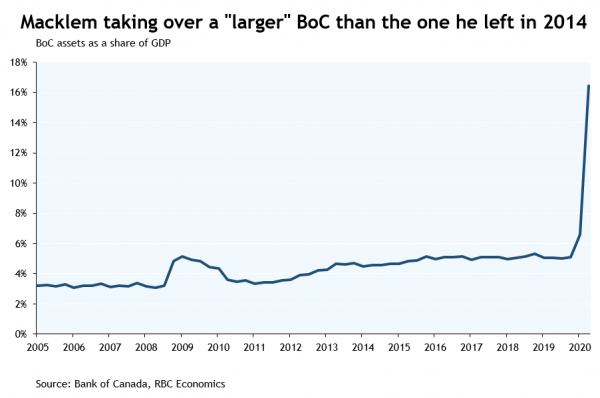- Macklem was Senior Deputy Governor from 2010-14
- Helped the BoC respond to the 2008-09 financial crisis
- Currently Dean of Rotman School of Management at UofT
Tiff Macklem has been appointed the tenth Governor of the Bank of Canada and will take over for Governor Poloz on June 3, the day of the BoC’s next scheduled rate announcement. Macklem is currently Dean of Rotman School of Management at the University of Toronto but spent much of his career at the Bank of Canada, including a stint as Senior Deputy Governor from 2010 to 2014. He also spent time at the Department of Finance as Associate Deputy Minister. Macklem was the perceived front-runner to replace Governor Carney in 2013 though the top job ultimately went to Poloz. His appointment continues a trend of bringing in outside leadership—Governor Thiessen (1994-2001) was the last Senior Deputy Governor to be promoted directly to Governor.
Macklem is taking the reins during a period of extraordinary economic and financial market disruption that has forced the BoC to redeploy many of the tools it developed (with Macklem’s help) to combat the 2008-09 financial crisis and recession. The bank has also launched a number of policies that it didn’t have to resort to a decade ago, including large scale asset purchases. While QE is still in its infancy, other liquidity support measures have already expanded the central bank’s balance sheet to 16% of GDP, more than three times its financial crisis levels. In that sense, Macklem is taking over a much larger central bank than the one he left six years ago.
In the near-term, Macklem and the rest of Governing Council will have to decide whether current policies are doing enough to support an economy that is in the midst of a record-breaking contraction. The bank has already had some success in improving financial market functioning and keeping borrowing costs manageable. But the longer the crisis drags on, and the greater the borrowing needs of governments, businesses and households, the more the BoC will face pressure to expand its offerings or provide more direct credit support as other central banks have done. Macklem will also have to ensure policies are in place to support an eventual recovery when coronavirus containment measures are eased. Governor Poloz has framed the bank’s asset purchases as supporting market functioning, as opposed to the traditional aim of reducing longer-term interest rates, but we think the latter goal will take over as monetary policy shifts from crisis management to stimulus.
In the medium term, Macklem will also have to develop an exit strategy from the extraordinary levels of stimulus that are currently being provided. While some of the bank’s liquidity support measures will naturally shrink as demand for them declines, unwinding QE has been a tough nut to crack for other central banks. Another (related) medium term challenge will be addressing Canada’s already-high debt loads that are only being exacerbated by demand for credit and income losses caused by the coronavirus crisis. If indebtedness made withdrawing stimulus (including rates cuts to address the oil price shock) difficult in 2017-18, the challenge will be far greater during Macklem’s seven year tenure—even for a Governor that can rely on his experience with the Financial Stability Board.

